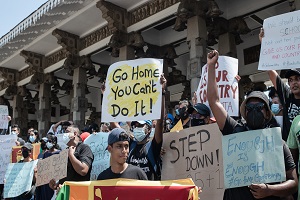
By Neelam Rahim
Sri Lanka has been rocked by protests, warning protesters that they will not let up until President Gotabaya Rajapaksa resigns. This follows months of protests in the volatile country. Protesters in their numbers stormed the president’s home and office and the prime minister’s official residence at the weekend. The President is being blamed for the country’s economic problems.
Political expert Brooks Spector discusses with Radio Islam that the responsibility is widespread. Still, several decisions were made along the way as a family and as political leaders that, in retrospect, have caused problems.
“The most important of these is the infrastructure building plans that exceeded their ability to pay. They went ahead with a whole range of infrastructure plans that ultimately couldn’t come up with the money to pay for because their credit was overextended. And crucially, because of COVID19 and a variety of other things. The mainstay of their economy, tourism, dried up and virtually disappeared. A foreign exchange crisis ensues, and the cost of fuel and imported food rises. And now they’re stuck, and there was no place to go,” he said.
There have been various comments and parallels. Some have been wondering aloud whether something similar could happen in South Africa with the public forcing the president to resign. Others have commented that they stormed the presidential residence but didn’t burn or break. They enjoyed the pool, the shower and the bed.
Brooks further tells Radio Islam, “what’s likely to happen is that there’ll be a lot of unhappiness. Eventually, a consortium of those nations and international institutions through which Sri Lanka owes money will figure out a way to refinance. Some maybe not all of its international debt, but certainly some of it. And some emergency measures to provide a lifeline of foreign currency sufficient to import some fuel and some food but in exchange, to impose the kinds of things that most people don’t like to hear, which austerity is. And that usually means things like laying off large numbers of superfluous government employees, cancelling various vanity projects, and cutting back government expenditures. Most likely things like pensions and social welfare payments, as well. And none of that will be pleasant or appreciated by people either. So it’s the way out of their particular dilemma. There’s no easy solution.”
For more about this, listen to Radio Islam’s podcast below.







0 Comments